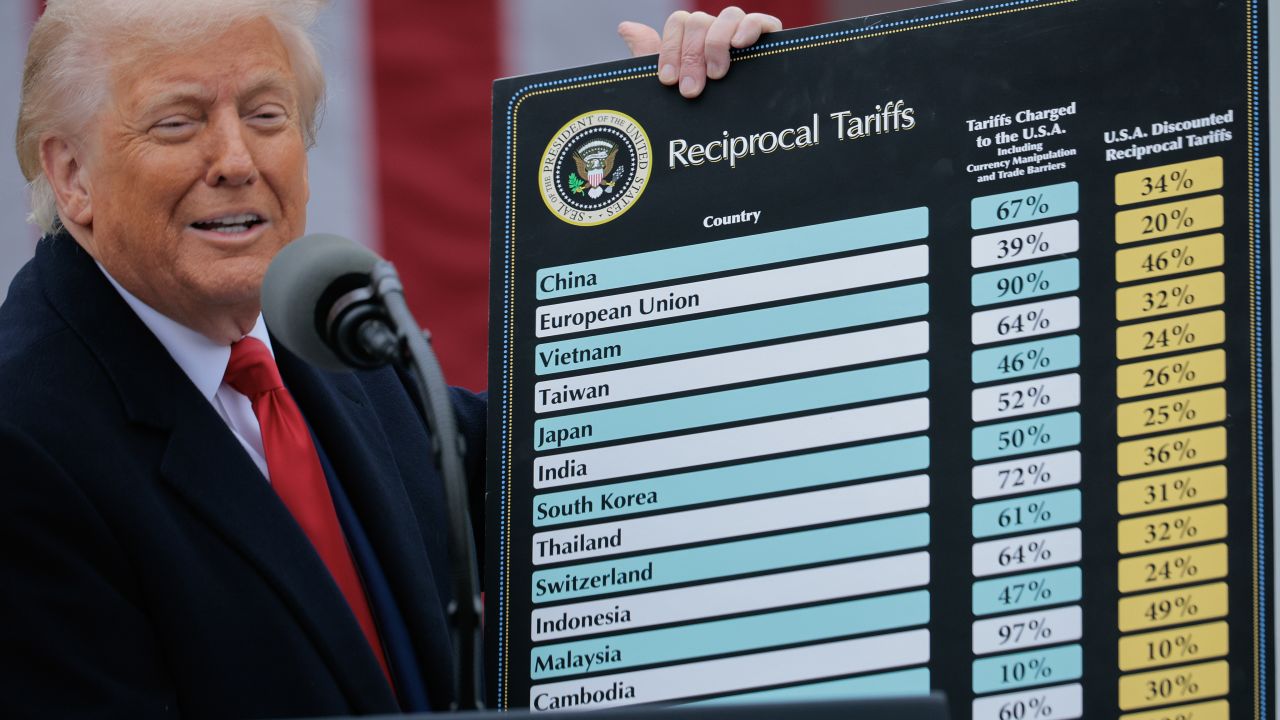China imposes 34% reciprocal tariffs on imports of US goods China said on Friday it will impose reciprocal 34% tariffs on all imports from the United States starting April 10. On Wednesday, US President Donald Trump unveiled an additional 34% tariffs on all Chinese goods imports into the US, in a move poised to cause a major reset of relations and escalate a trade war between the world’s two largest economies. “This practice of the US is not in line with international trade rules, seriously undermines China’s legitimate rights and interests, and is a typical unilateral bullying practice,” China’s State Council Tariff Commission said in a statement announcing its retaliatory tariffs.
Remember: Since returning to power in January, Trump had already levied two tranches of 10% additional duties on all Chinese imports, which the White House said was necessary to stem the flow of illicit fentanyl from the country to the US. That means Chinese arriving in the US would be effectively subject to 54% tariffs. Selloff in European stocks continues after "most significant tariff increases" in US in over a century Stock markets in Europe fell again Friday, two days after US President Donald Trump unveiled hefty tariffs on all trading partners.

The region’s benchmark Stoxx 600 index was trading 2% lower by 5 a.m. ET, while France’s CAC was 1.
6% down and Germany’s DAX index fell 2%. London’s FTSE 100 , meanwhile, dropped 1.7%.
Jochen Stanzl, chief market analyst at CMC Markets, a provider of online trading and investing, called Wednesday’s announcement “the most significant tariff increases in over a century.” On Thursday, the STOXX 600 tumbled 2.6%, erasing its gains since January.
The DAX fell 3% and the CAC slumped 3.3%. But all three major indexes in the United States fell even more , posting their biggest single-day drop since 2020.
The Dow lost almost 4%. The broader S&P 500 was down by 4.9% and the tech-heavy Nasdaq plunged nearly 6%.
“Investors have long anticipated that the imposition of tariffs from the White House would drive (other) nations closer together while isolating the US,” Stanzl said Friday. “This speculation has not only materialized but has also far exceeded the worst fears due to the sheer scale of reciprocal tariffs. Downgrades for US stocks are pouring in, profit estimates are being revised downward.
” EU could target individual businesses to hit back at US, says French finance minister France’s finance minister said the European Union was not looking at reciprocal tariffs to respond to the Trump administration’s tariffs, as that could hurt European consumers. Instead, measures under consideration are targeted at individual firms rather than sectors, Eric Lombard said in an interview Friday with CNN affiliate BFMTV. “We have fiscal tools, and the advantage of fiscal tools is that they can affect businesses but not whole sectors and they don’t have an impact on the cost of products in Europe.
We really want to protect the citizens of the European Union as much as we can,” he said. Lombard also said Europe would enact a “proportionate response” to President Donald Trump’s tariffs, which would be aimed at bringing the United States to the “negotiating table.” Canada says relationship with US will never be the same after Trump's tariffs Canada’s relationship with the United States “will never be the same again” after President Donald Trump imposed sweeping tariffs, Canadian Foreign Minister Mélanie Joly said Friday.
“They (the US) want to do things differently and we understand that, and that’s why we will seek to make sure that we get to an agreement on trade but also on security because both cannot be siloed,” Joly said. She said Trump “respects strength,” which is why Canada has imposed 60 billion Canadian dollars’ worth of counter tariffs on American products. “We announced new counter tariffs on auto yesterday, because we think that it is ultimately the best way to get to a good deal eventually,” she said, adding Canada is putting “maximum pressure” on the Trump administration.
While no further tariffs were imposed on Canada and Mexico, two of America’s top trading partners, this week, Trump had previously announced 25% tariffs on both countries for what he called inadequate efforts to curb migration and fentanyl trafficking. Trump later agreed to pause tariffs for products covered by the United States-Mexico-Canada Agreement (USMCA) free trade treaty. Auto industry tariffs may cause a ripple effect, Canadian economist says The tit-for-tat tariffs imposed by the US and Canada will extend far beyond their respective auto manufacturing sectors, an economist told CNN.
“We’re not too surprised about the fact that this has put a stoppage essentially, immediately, to some production facilities. And the repercussions will play out on more and more industries that are interconnected with the auto parts sector,” said Pedro Antunes, chief economist at the Conference Board of Canada. On Thursday, Canada imposed a 25% counter tariff on imported, US-made vehicles entering the country in response to the US implementing levies on all foreign-made cars.
Automaker Stellantis , which makes Chrysler and Dodge vehicles, halted production at several Canadian and Mexican plants on Thursday. The company also temporarily laid off 900 US based staff. The shutdown may cause a ripple effect throughout the auto parts industry, Antunes told CNN’s John Vause.
“Truth is that, you know, the 25% tariffs that are being applied now for Canadian exports into the US of autos and parts — this is ...
essentially, very damaging. It’s just non-competitive. And the US auto industry will be .
.. unable to sell those cars,” he said.
Antunes warned that reciprocal tariffs could lead to permanent layoffs and a broader economic downturn. UK and US are in discussions to strike economic deal, British foreign secretary says The United Kingdom is in talks with the United States to strike an economic agreement, according to Britain’s foreign minister. “The UK, like France, is a great maritime nation.
We are a nation that believes in open trade. And I regret the return to protectionism in the US, something we have not seen for nearly a century,” David Lammy said Friday. “We are engaged in discussions with the US to strike an economic agreement and an economic deal.
And of course, we have been absolutely clear that all options are on the table, as we ensure the national interest of the British people, who will be very concerned at this time about how this affects the bottom line for them and their economic welfare.”.















